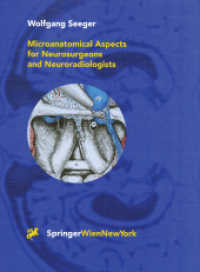- ホーム
- > 洋書
- > 英文書
- > Science / Mathematics
Full Description
Fabrication and Advanced Applications of Nanomaterial-Based Electrochemical Sensors will help students understand the concept of nanomaterial-based electrochemical sensors easily by giving simple examples and illustrations. Electrochemical sensors can determine various bioactive compounds and organic molecules, but the further addition of nanomaterials into the electrode can increase the detection limit due to their excellent electrical and chemical properties and their huge surface area. Nanomaterial-based electrochemical sensors can also detect toxic waste and thereby reduce the risk of waterborne diseases to both humans and aquatic animals. This book seeks to enhance environmental awareness and explain how electrochemical sensors contribute to a more sustainable and conscious way of living. The book will be useful for researchers who are fabricating various nanomaterial-based electrodes to determine neurotransmitters, organics, toxic dyes, surfactants, and various bioactive compounds as well as engineering, chemistry, electrochemistry, and nanomaterial students at the undergraduate and postgraduate level.
Key Features:
The first book to cover novel applications of nanomaterial-based electrochemical sensors
Discusses various nanomaterials and composite materials as modifiers for the electrochemical determination of different dyes, pesticides, toxic chemicals, neurotransmitters, food additives, and heavy metals
Describes the facilitation of nanomaterial-based electrochemical sensors as compared with other conventional modifiers
Contents
Chapter 1: Advancement in Electrochemical Sensing Technology
Chapter 2: How Nanomaterials Facilitated Electrochemical Sensor Research
Chapter 3: How Nanomaterials Based Electrochemical Sensors Are Used For Biomedical Applications
Chapter 4: Fabrication of Electrochemical Sensors for Determination of Toxic Dyes
Chapter 5: Advanced Electrochemical Sensing Devices For Analysis Of Pesticides, Insecticides, And Other Toxins In Food Products
Chapter 6: Recent Advances In Nanomaterials Based Electrochemical Sensors For Pharmaceutical And Biomedical Diagnosis
Chapter 7: Applications Of Nanoelectrochemical Sensors To Determine Vitamins and Hormones
Chapter 8: Determination of Medical Wastes by Nanomaterial Based Electrodes
Chapter 9: Advances in Glucose Electrochemical Sensors Using Nanomaterials
Chapter 10: How Nanomaterial-based Sensors Contribute To A More Sustainable Environment
Chapter 11: Limitations, Challenges, and Future Aspects of Electrochemical Sensing Devices.
Chapter 12: Advantages of Nanomaterial Modified Electrochemical Sensors Over Conventional Electrochemical Sensors
Chapter 13: Carbon-based Nanomaterials: Synthesis, Characterization, and Applications of Electrochemical Sensors and Biosensors








